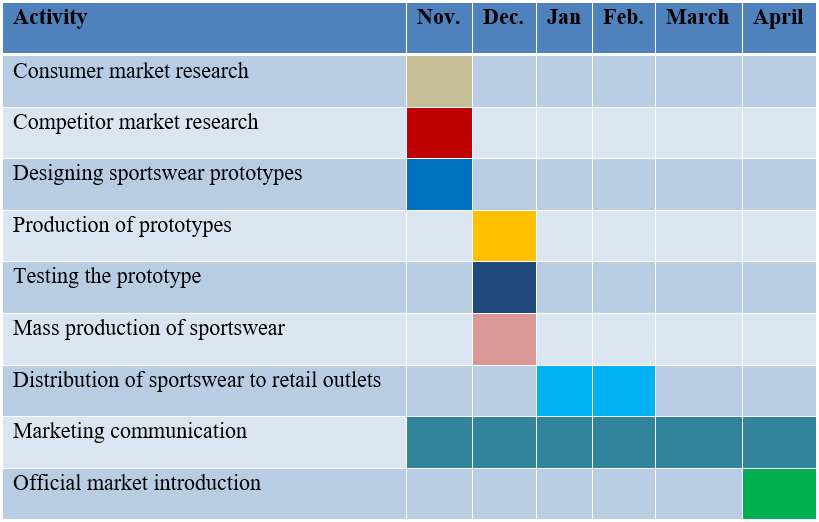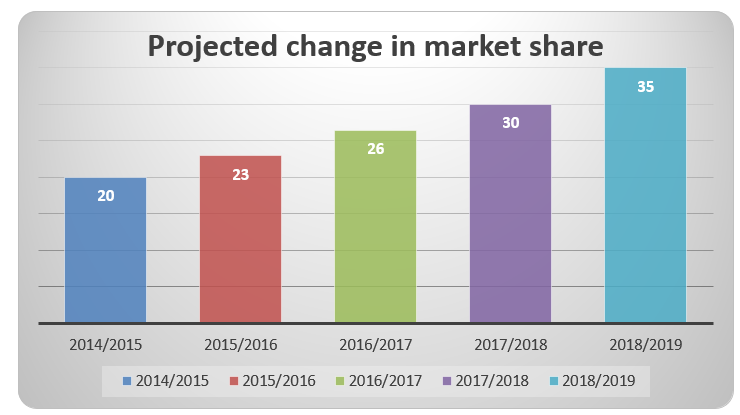Branding, pricing and distribution strategies
Edimax will adopt family branding strategy by ensuring that its different product categories such as sports apparels and footwear are marketed under the brand name ‘Edimax’. Family branding will enable the firm to increase the rate of brand recognition (Lacobucci, 2014). Conversely, the firm will adopt the penetration-pricing strategy by setting the price at a relatively lower point as compared to its competitors. The penetration pricing strategies will enable the firm to attract customers within the low-income category. In distribution, the firm will incorporate direct and indirect channels of distribution. In its direct distribution, Edimax will establish retail outlets in the local and international markets. Furthermore, the firm will distribute its products through agents. However, this approach will mainly be used in newly entered international markets.
Type of competition
Edimax will experience stiff inter-brand competition from various local and multinational sportswear companies. Some of the companies that will pose intense inter-brand competition to the firm include Nike, Adidas, Li Ling, Under Armour, and Puma. These companies have developed considerable cost advantage by investing in large-scale economies of operation (Lipsey, 2006). Companies such as Addidas and Nike Incorporation have outsourced their production activities from independent contractors located in countries characterized by a high comparative advantage with regard to production. Thus, the firms have succeeded in minimizing the cost of production. Furthermore, the firms have established an extensive sales and distribution network, which has remarkably led to the development of the companies’ global brand recognition (Rugman, 2005).
Despite their global brand recognition, some of Edimax’s major competitors have not developed optimal competitiveness with reference to pricing. For example, Nike Incorporation, Puma, Adidas, and Under Armour have adopted the premium-pricing strategy. The companies’ choice of the premium pricing strategy is based on the need to communicate the value of their brand. However, the strategy limits the firms’ ability to gain a significant market share in the low and middle-income countries.
Differentiation strategy
Edimax will incorporate focused differentiation strategy in its quest to enter the global sportswear industry. It will consider research and development as one of its priorities areas in its operation. The firm will establish a fully-fledged laboratory that will enhance its ability to undertake product research and development. Furthermore, the firm will gather market intelligence continuously by conducting market research through online mediums in order to gather customer opinion. This strategy will improve the firm’s ability to develop unique and customized sportswear products. Thus, Edimax will succeed in redefining style and quality within the global sportswear industry. Therefore, the firm will attract a considerable number of sports’ fans (Ferrell & Hartline, 2011).
Market leader
Despite the intense competition in the global sportswear industry, Edimax intends to attain a market leadership position. In a bid to achieve this goal, the firm will challenge the existing major competitors by investing in aggressive product and market development. The firm will invest in intensive market research in order to understand the competitors’ activities. Subsequently, the firm will develop highly competitive products, hence attaining a significant market share (Ferrell & Hartline, 2011).
Macro environmental impact
The firm’s ability to implement the marketing strategy will be subject to the prevailing macro-environmental forces as illustrated herein. First, the prevailing legal framework such as the Intellectual Property Rights [IPRs] will influence the ability to invest in product innovation. Changes in the political relationship between the UK and the international community will also influence the firm’s ability to implement growth strategies, for example, penetrating the international market.
The firm’s level of profitability will be subject to the prevailing economic environment. Negative economic cycles such as economic recessions will hinder Edimax’s capacity to maximize its profitability due to change in the consumers’ tastes and preferences and the cost of production. Conversely, a positive economic cycle such as boom will enable the firm to maximize its sales revenue and hence the level of profitability. Edimax will also be affected by social changes; for example, a negative change in the consumers’ perception regarding the firm might affect its capacity to increase its customer base. In a bid to deal with social changes, the firm will be committed to establishing a strong relationship with the community to improve its reputation. Additionally, the firm will be subject to technological changes. Firms are progressively integrating new production and marketing technologies in the quest to attain an optimal market position. The firm will upgrade its technological capacity progressively in order improve its production, operations, and marketing processes.
Marketing research tools
Prior to the formulation of the marketing strategies, Edimax undertook a comprehensive market research in order to understand the prevailing market dynamics. The research targeted both consumers and competitors. The firm incorporated both primary and secondary market research techniques. The primary market research was conducted online using well-designed questionnaires that were distributed to a sample of the target consumer group in order to understand their behavior. Conversely, secondary research was conducted by studying the competitors’ report in order to gain intelligence on potential gaps.
Implementation strategy
Edimax is committed to entering the global sportswear industry successfully. In a bid to achieve this goal, the firm has formulated a comprehensive framework that outlines the activities that will be undertaken in order to ensure successful market entry. The firm will adopt the concept of the functional departmentalization in the process of implementing the strategy. Smit (2007) asserts that the functional departmentalization enables an organization to group and assign related activities to a particular department. Thus, the firm will ensure a high level of expertise in implementing the various strategies. The table below illustrates how the responsibilities will be distributed.
Table 1
The firm will ensure that the activities are implemented within a specific timeline. Consequently, the firm will follow the gannt chart.

Chart 1
5-year expansion plan
In its pursuit for market dominance, Edimax will invest in an aggressive expansion plan. The firm intends to position itself successfully as a multinational corporation in the global sportswear industry within five years. In a bid to achieve this goal, the firm will adopt best strategic management practices. First, it will incorporate diverse corporate level strategies such as market organic growth, partnerships, mergers, and acquisition. In its acquisition strategy, the firm will target small firms in the sportswear industry. One of the partnership strategies that the firm will adopt includes franchising. Furthermore, Edimax is committed to continuous improvement of its marketing communication in order to create optimal market awareness.
Successful implementation of these strategies will improve Edimax’s rate of market penetration. The firm also projects that successful implementation of these strategies will enhance its ability to achieve the set marketing objectives. First, the firm intends to improve its level of annual profitability by 30% every year. The projected percentage change in the level of profitability will enhance the firm’s ability to develop its financial strength, hence the capacity to invest in new product development.
Table 2

The firm intends to grow its market share continuously. During its 2014/2015 financial year, the firm intends to attract 1,000,000 million customers. According to the firm’s predetermined objective, it will grow its customer base by 25% every year. The chart below illustrates the projected customer base within five years of its operation.
Table 3

Similarly, Edimax is committed to ensuring that its market share grows significantly. By the end of its 2014/2015 financial year, the firm intends to have increased its market share to 20%. Subsequently, the firm projects its market share to increase to 35% by 2019.
Table 4

Performance standards, monitoring and financial controls
Edimax will integrate a number of aspects into performance standards, monitoring, and financial controls in assessing its marketing success.
Performance standards
One of the performance standards that the firm will consider entails brand recognition. The firm will evaluate the extent to which the target and the general markets have developed brand recognition. Thus, it will determine the effectiveness of its marketing communication processes. Secondly, the firm will gauge its performance by evaluating the extent to which it has succeeded in penetrating new markets. Thus, its management team will project the possibility of increasing its sales revenue and profitability (Lamb, Hair & McDaniel, 2012).
Monitoring methods
The firm will assess the percentage change in its market share by tracking the increase in its customer base progressively in order to determine its success in attracting and retaining customers. The firm will also evaluate the customers’ opinion regarding the quality of its sportswear products by obtaining market feedback through online mediums. Subsequently, the Edimax’s management team will be in a position to understand the customers’ opinions. Secondly, the firm will assess its performance by evaluating the change in the level of its profitability. The 5-year expansion plan cites profitability as one of the core aspects that the firm has taken into account.
Financial control
Edimax appreciates the challenges associated with resource constraints such as finances. Thus, it will implement effective financial control measures. First, the firm will ensure that all its marketing activities are well budgeted. Therefore, it will be in a position to gauge the actual budget with the cost incurred in undertaking its marketing activities. Moreover, the firm will allocate finances for possible contingencies that might arise. Thus, the likelihood of successful implementation of the marketing plan will increase. Secondly, the firm will conduct financial control by conducting a financial audit in order to assess whether the budgetary allocation to various marketing activities is utilized optimally.
Company potential
Edimax will ensure that all the aforementioned aspects are taken into account in its marketing and operational processes. Consequently, it will achieve and exceed the benchmarks outlined in the predetermined marketing objectives, thus attaining a high level of business sustainability.
Integrated marketing communications
In order to create optimal market awareness, Edimax will focus on a number of integrated marketing communications as explained below.
Mass communication
The firm will create awareness by adopting diverse marketing communication mediums. For example, it will advertise through conventional mediums such as print media [sports magazines, newspapers], television, and radio. Moreover, the firm will also incorporate online marketing tools such as the company’s website. Additionally, it will incorporate social media platforms such as Facebook and YouTube and these platforms will provide an opportunity to post images and videos’ of its products. Considering the high rate at which consumers are adopting social media in interacting with other consumers, Edimax will succeed in exploiting the ‘word of mouth’ effect associated with social media.
Sales promotion
Edimax will create market awareness through sales promotion. The firm will integrate both quantity and price discounts to enhance the capacity to attract individual and institutional customers.
References
Ferrell, O., & Hartline, M. (2011). Marketing strategy. Mason, OH: South-Western Cengage.
Lacobucci, D. (2014). MM4: Marketing management. Mason, OH: Cengage Learning.
Lamb, C., Hair, J. & McDaniel, C. (2012). Essentials of marketing. Mason, OH: Cengage.
Lipsey, R. (2006). The sporting goods industry: history, practices, and products. Jefferson, NC: McFarland & Company.
Rugman, A. (2005). The regional multinationals: MNE’s and global strategic management. Cambridge, UK: Cambridge University Press.
Smit, P. (2007). Management principles; a contemporary edition for Africa. Cape Town, SA: Juta.